Law for Licensed Premises: Consumer Protection and Employer Liability
VerifiedAdded on 2020/12/09
|14
|4726
|121
Report
AI Summary
This report delves into the legal framework governing licensed premises, focusing on consumer protection, employer liability, and regulatory compliance. It examines the consequences of providing misleading information to consumers, evaluating the extent of employer liability in safeguarding consumer rights, and exploring policies for implementing weights and measures legislation. The report further discusses key components of various regulations, including the Licensing Act 2003 and Consumer Protection from Unfair Trading Regulations 2008, and the duties and responsibilities associated with managing licensed premises, along with the impact of food safety and hygiene legislation. It also justifies employer responsibilities in staff employment and discusses key aspects of discrimination legislation. The Briton's Protection Manchester pub serves as a case study to illustrate the practical application of these laws and regulations, providing a comprehensive overview of the legal requirements for operating such establishments.
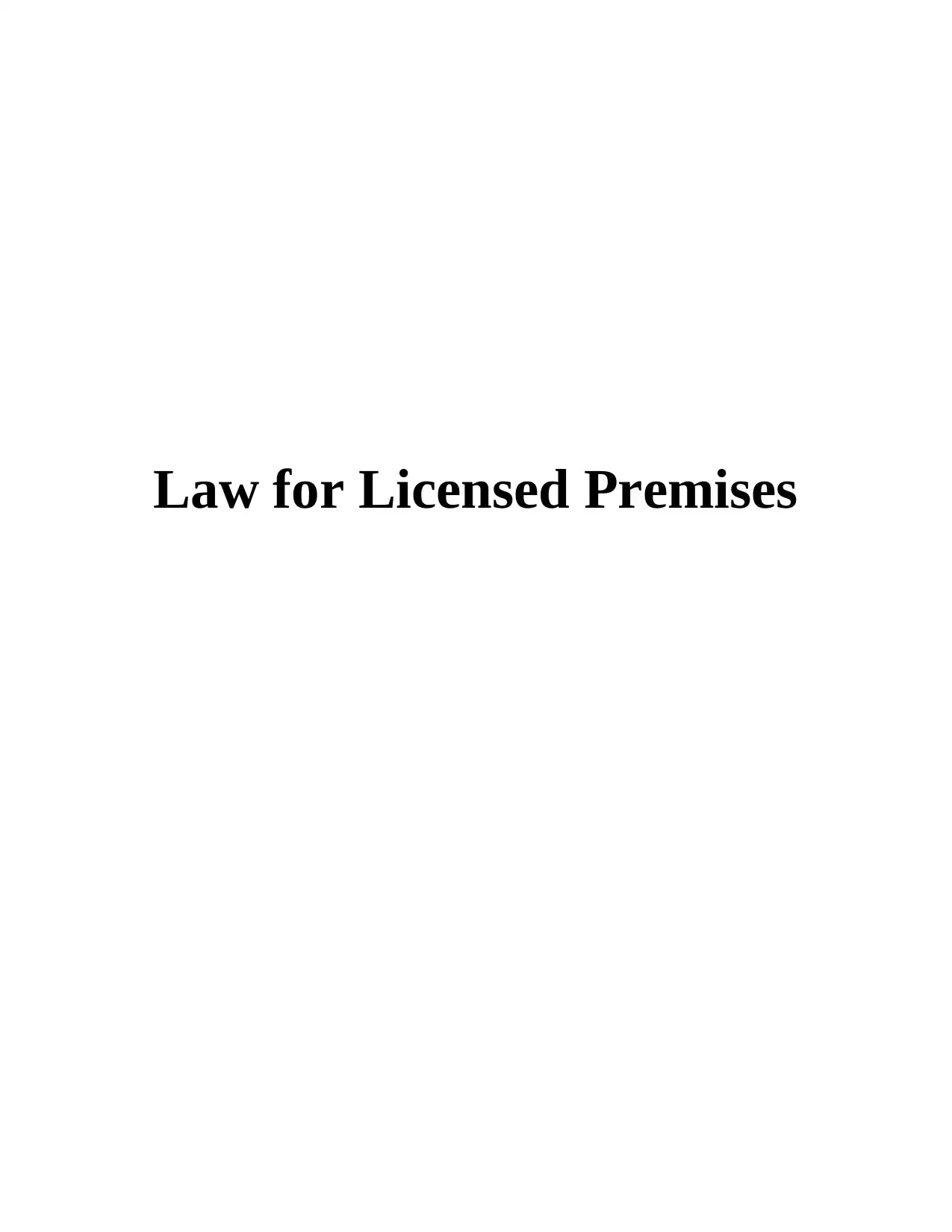
Law for Licensed Premises
Paraphrase This Document
Need a fresh take? Get an instant paraphrase of this document with our AI Paraphraser
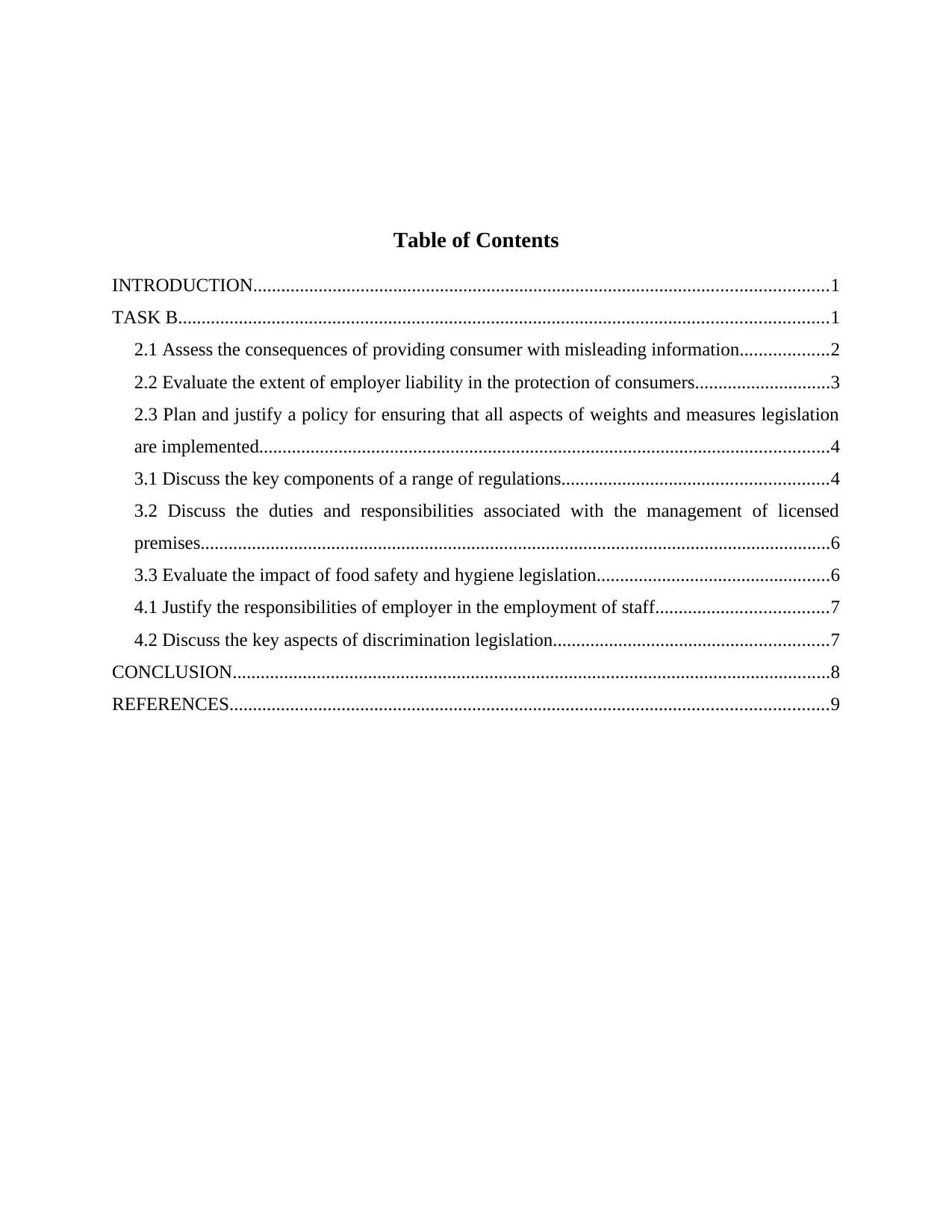
Table of Contents
INTRODUCTION...........................................................................................................................1
TASK B...........................................................................................................................................1
2.1 Assess the consequences of providing consumer with misleading information...................2
2.2 Evaluate the extent of employer liability in the protection of consumers.............................3
2.3 Plan and justify a policy for ensuring that all aspects of weights and measures legislation
are implemented..........................................................................................................................4
3.1 Discuss the key components of a range of regulations.........................................................4
3.2 Discuss the duties and responsibilities associated with the management of licensed
premises.......................................................................................................................................6
3.3 Evaluate the impact of food safety and hygiene legislation..................................................6
4.1 Justify the responsibilities of employer in the employment of staff.....................................7
4.2 Discuss the key aspects of discrimination legislation...........................................................7
CONCLUSION................................................................................................................................8
REFERENCES................................................................................................................................9
INTRODUCTION...........................................................................................................................1
TASK B...........................................................................................................................................1
2.1 Assess the consequences of providing consumer with misleading information...................2
2.2 Evaluate the extent of employer liability in the protection of consumers.............................3
2.3 Plan and justify a policy for ensuring that all aspects of weights and measures legislation
are implemented..........................................................................................................................4
3.1 Discuss the key components of a range of regulations.........................................................4
3.2 Discuss the duties and responsibilities associated with the management of licensed
premises.......................................................................................................................................6
3.3 Evaluate the impact of food safety and hygiene legislation..................................................6
4.1 Justify the responsibilities of employer in the employment of staff.....................................7
4.2 Discuss the key aspects of discrimination legislation...........................................................7
CONCLUSION................................................................................................................................8
REFERENCES................................................................................................................................9
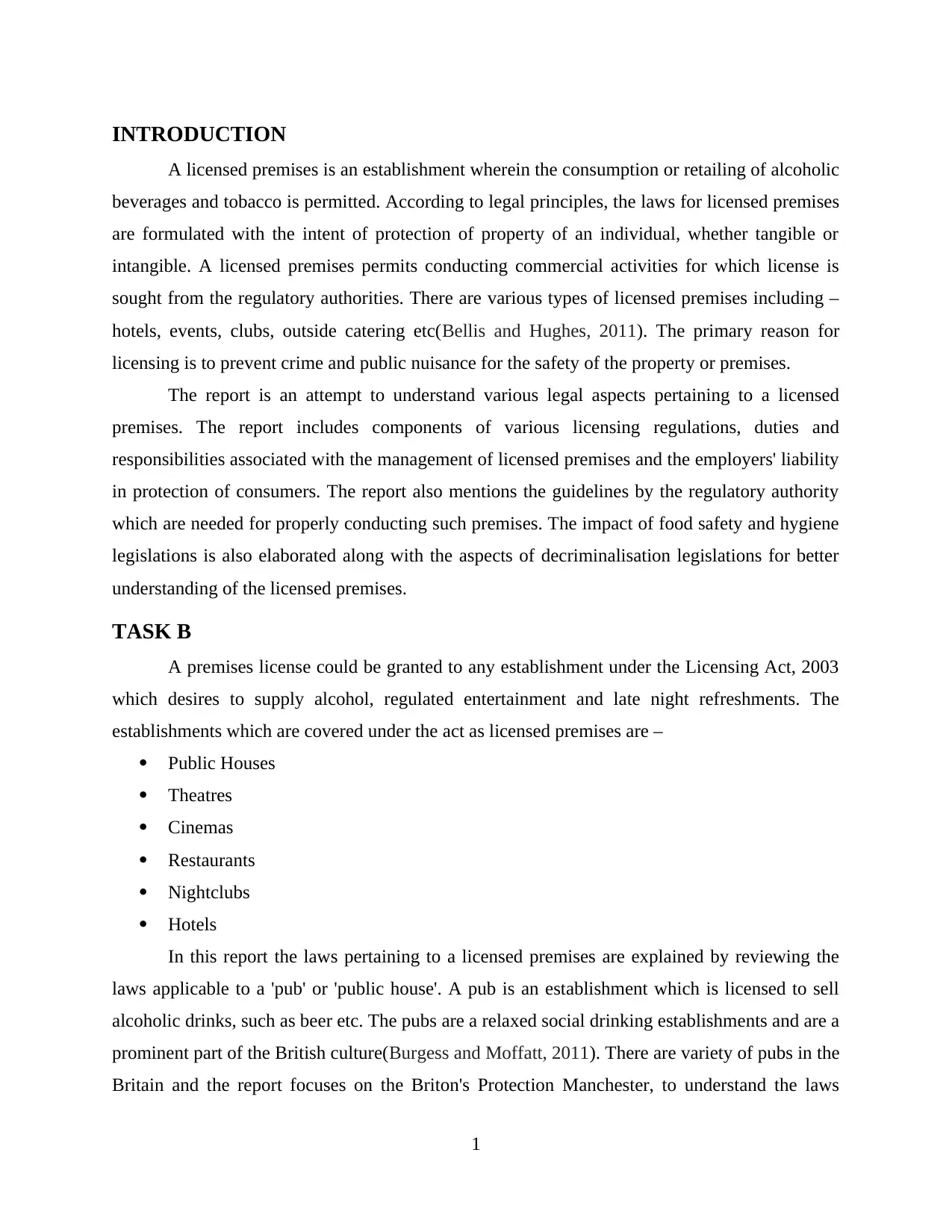
INTRODUCTION
A licensed premises is an establishment wherein the consumption or retailing of alcoholic
beverages and tobacco is permitted. According to legal principles, the laws for licensed premises
are formulated with the intent of protection of property of an individual, whether tangible or
intangible. A licensed premises permits conducting commercial activities for which license is
sought from the regulatory authorities. There are various types of licensed premises including –
hotels, events, clubs, outside catering etc(Bellis and Hughes, 2011). The primary reason for
licensing is to prevent crime and public nuisance for the safety of the property or premises.
The report is an attempt to understand various legal aspects pertaining to a licensed
premises. The report includes components of various licensing regulations, duties and
responsibilities associated with the management of licensed premises and the employers' liability
in protection of consumers. The report also mentions the guidelines by the regulatory authority
which are needed for properly conducting such premises. The impact of food safety and hygiene
legislations is also elaborated along with the aspects of decriminalisation legislations for better
understanding of the licensed premises.
TASK B
A premises license could be granted to any establishment under the Licensing Act, 2003
which desires to supply alcohol, regulated entertainment and late night refreshments. The
establishments which are covered under the act as licensed premises are –
Public Houses
Theatres
Cinemas
Restaurants
Nightclubs
Hotels
In this report the laws pertaining to a licensed premises are explained by reviewing the
laws applicable to a 'pub' or 'public house'. A pub is an establishment which is licensed to sell
alcoholic drinks, such as beer etc. The pubs are a relaxed social drinking establishments and are a
prominent part of the British culture(Burgess and Moffatt, 2011). There are variety of pubs in the
Britain and the report focuses on the Briton's Protection Manchester, to understand the laws
1
A licensed premises is an establishment wherein the consumption or retailing of alcoholic
beverages and tobacco is permitted. According to legal principles, the laws for licensed premises
are formulated with the intent of protection of property of an individual, whether tangible or
intangible. A licensed premises permits conducting commercial activities for which license is
sought from the regulatory authorities. There are various types of licensed premises including –
hotels, events, clubs, outside catering etc(Bellis and Hughes, 2011). The primary reason for
licensing is to prevent crime and public nuisance for the safety of the property or premises.
The report is an attempt to understand various legal aspects pertaining to a licensed
premises. The report includes components of various licensing regulations, duties and
responsibilities associated with the management of licensed premises and the employers' liability
in protection of consumers. The report also mentions the guidelines by the regulatory authority
which are needed for properly conducting such premises. The impact of food safety and hygiene
legislations is also elaborated along with the aspects of decriminalisation legislations for better
understanding of the licensed premises.
TASK B
A premises license could be granted to any establishment under the Licensing Act, 2003
which desires to supply alcohol, regulated entertainment and late night refreshments. The
establishments which are covered under the act as licensed premises are –
Public Houses
Theatres
Cinemas
Restaurants
Nightclubs
Hotels
In this report the laws pertaining to a licensed premises are explained by reviewing the
laws applicable to a 'pub' or 'public house'. A pub is an establishment which is licensed to sell
alcoholic drinks, such as beer etc. The pubs are a relaxed social drinking establishments and are a
prominent part of the British culture(Burgess and Moffatt, 2011). There are variety of pubs in the
Britain and the report focuses on the Briton's Protection Manchester, to understand the laws
1
⊘ This is a preview!⊘
Do you want full access?
Subscribe today to unlock all pages.

Trusted by 1+ million students worldwide
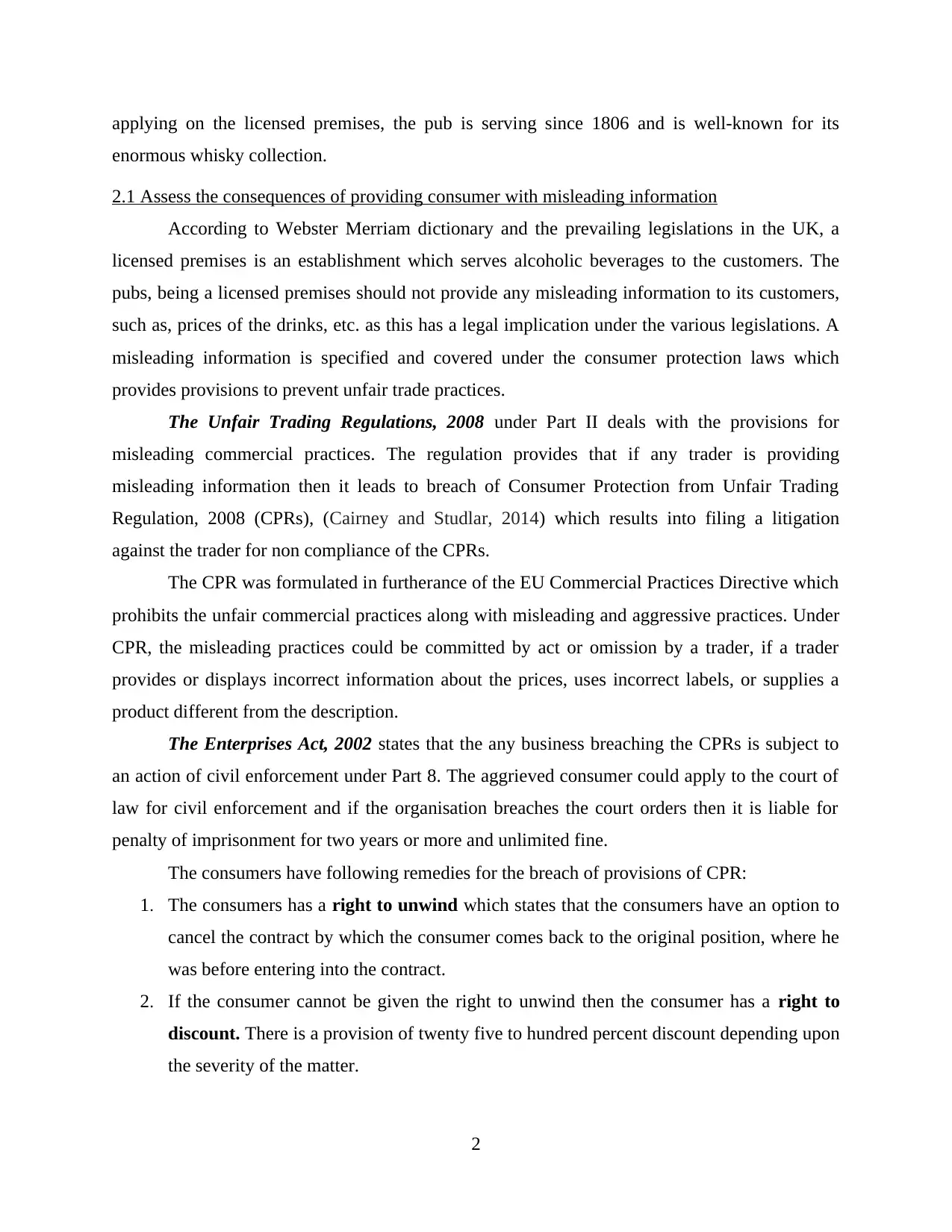
applying on the licensed premises, the pub is serving since 1806 and is well-known for its
enormous whisky collection.
2.1 Assess the consequences of providing consumer with misleading information
According to Webster Merriam dictionary and the prevailing legislations in the UK, a
licensed premises is an establishment which serves alcoholic beverages to the customers. The
pubs, being a licensed premises should not provide any misleading information to its customers,
such as, prices of the drinks, etc. as this has a legal implication under the various legislations. A
misleading information is specified and covered under the consumer protection laws which
provides provisions to prevent unfair trade practices.
The Unfair Trading Regulations, 2008 under Part II deals with the provisions for
misleading commercial practices. The regulation provides that if any trader is providing
misleading information then it leads to breach of Consumer Protection from Unfair Trading
Regulation, 2008 (CPRs), (Cairney and Studlar, 2014) which results into filing a litigation
against the trader for non compliance of the CPRs.
The CPR was formulated in furtherance of the EU Commercial Practices Directive which
prohibits the unfair commercial practices along with misleading and aggressive practices. Under
CPR, the misleading practices could be committed by act or omission by a trader, if a trader
provides or displays incorrect information about the prices, uses incorrect labels, or supplies a
product different from the description.
The Enterprises Act, 2002 states that the any business breaching the CPRs is subject to
an action of civil enforcement under Part 8. The aggrieved consumer could apply to the court of
law for civil enforcement and if the organisation breaches the court orders then it is liable for
penalty of imprisonment for two years or more and unlimited fine.
The consumers have following remedies for the breach of provisions of CPR:
1. The consumers has a right to unwind which states that the consumers have an option to
cancel the contract by which the consumer comes back to the original position, where he
was before entering into the contract.
2. If the consumer cannot be given the right to unwind then the consumer has a right to
discount. There is a provision of twenty five to hundred percent discount depending upon
the severity of the matter.
2
enormous whisky collection.
2.1 Assess the consequences of providing consumer with misleading information
According to Webster Merriam dictionary and the prevailing legislations in the UK, a
licensed premises is an establishment which serves alcoholic beverages to the customers. The
pubs, being a licensed premises should not provide any misleading information to its customers,
such as, prices of the drinks, etc. as this has a legal implication under the various legislations. A
misleading information is specified and covered under the consumer protection laws which
provides provisions to prevent unfair trade practices.
The Unfair Trading Regulations, 2008 under Part II deals with the provisions for
misleading commercial practices. The regulation provides that if any trader is providing
misleading information then it leads to breach of Consumer Protection from Unfair Trading
Regulation, 2008 (CPRs), (Cairney and Studlar, 2014) which results into filing a litigation
against the trader for non compliance of the CPRs.
The CPR was formulated in furtherance of the EU Commercial Practices Directive which
prohibits the unfair commercial practices along with misleading and aggressive practices. Under
CPR, the misleading practices could be committed by act or omission by a trader, if a trader
provides or displays incorrect information about the prices, uses incorrect labels, or supplies a
product different from the description.
The Enterprises Act, 2002 states that the any business breaching the CPRs is subject to
an action of civil enforcement under Part 8. The aggrieved consumer could apply to the court of
law for civil enforcement and if the organisation breaches the court orders then it is liable for
penalty of imprisonment for two years or more and unlimited fine.
The consumers have following remedies for the breach of provisions of CPR:
1. The consumers has a right to unwind which states that the consumers have an option to
cancel the contract by which the consumer comes back to the original position, where he
was before entering into the contract.
2. If the consumer cannot be given the right to unwind then the consumer has a right to
discount. There is a provision of twenty five to hundred percent discount depending upon
the severity of the matter.
2
Paraphrase This Document
Need a fresh take? Get an instant paraphrase of this document with our AI Paraphraser
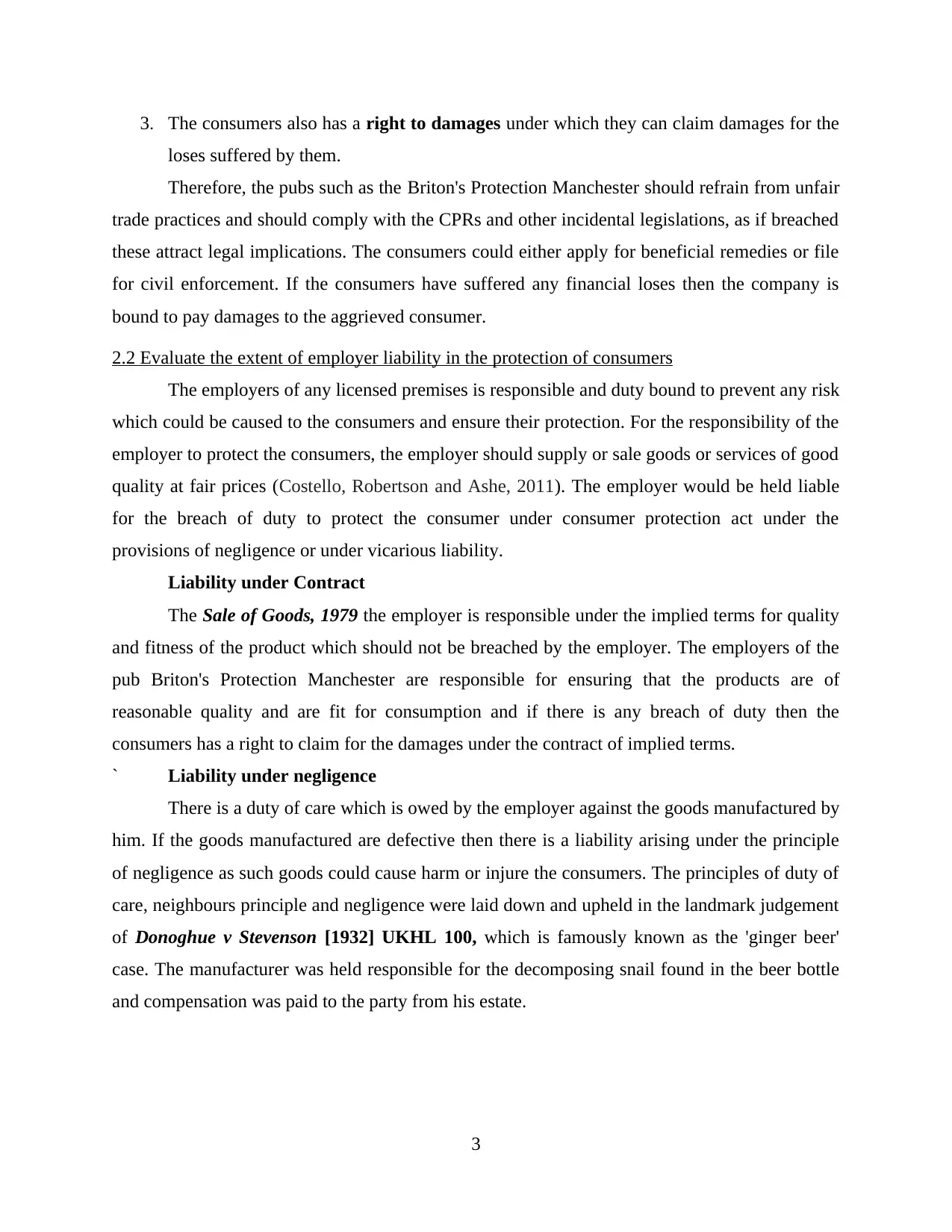
3. The consumers also has a right to damages under which they can claim damages for the
loses suffered by them.
Therefore, the pubs such as the Briton's Protection Manchester should refrain from unfair
trade practices and should comply with the CPRs and other incidental legislations, as if breached
these attract legal implications. The consumers could either apply for beneficial remedies or file
for civil enforcement. If the consumers have suffered any financial loses then the company is
bound to pay damages to the aggrieved consumer.
2.2 Evaluate the extent of employer liability in the protection of consumers
The employers of any licensed premises is responsible and duty bound to prevent any risk
which could be caused to the consumers and ensure their protection. For the responsibility of the
employer to protect the consumers, the employer should supply or sale goods or services of good
quality at fair prices (Costello, Robertson and Ashe, 2011). The employer would be held liable
for the breach of duty to protect the consumer under consumer protection act under the
provisions of negligence or under vicarious liability.
Liability under Contract
The Sale of Goods, 1979 the employer is responsible under the implied terms for quality
and fitness of the product which should not be breached by the employer. The employers of the
pub Briton's Protection Manchester are responsible for ensuring that the products are of
reasonable quality and are fit for consumption and if there is any breach of duty then the
consumers has a right to claim for the damages under the contract of implied terms.
` Liability under negligence
There is a duty of care which is owed by the employer against the goods manufactured by
him. If the goods manufactured are defective then there is a liability arising under the principle
of negligence as such goods could cause harm or injure the consumers. The principles of duty of
care, neighbours principle and negligence were laid down and upheld in the landmark judgement
of Donoghue v Stevenson [1932] UKHL 100, which is famously known as the 'ginger beer'
case. The manufacturer was held responsible for the decomposing snail found in the beer bottle
and compensation was paid to the party from his estate.
3
loses suffered by them.
Therefore, the pubs such as the Briton's Protection Manchester should refrain from unfair
trade practices and should comply with the CPRs and other incidental legislations, as if breached
these attract legal implications. The consumers could either apply for beneficial remedies or file
for civil enforcement. If the consumers have suffered any financial loses then the company is
bound to pay damages to the aggrieved consumer.
2.2 Evaluate the extent of employer liability in the protection of consumers
The employers of any licensed premises is responsible and duty bound to prevent any risk
which could be caused to the consumers and ensure their protection. For the responsibility of the
employer to protect the consumers, the employer should supply or sale goods or services of good
quality at fair prices (Costello, Robertson and Ashe, 2011). The employer would be held liable
for the breach of duty to protect the consumer under consumer protection act under the
provisions of negligence or under vicarious liability.
Liability under Contract
The Sale of Goods, 1979 the employer is responsible under the implied terms for quality
and fitness of the product which should not be breached by the employer. The employers of the
pub Briton's Protection Manchester are responsible for ensuring that the products are of
reasonable quality and are fit for consumption and if there is any breach of duty then the
consumers has a right to claim for the damages under the contract of implied terms.
` Liability under negligence
There is a duty of care which is owed by the employer against the goods manufactured by
him. If the goods manufactured are defective then there is a liability arising under the principle
of negligence as such goods could cause harm or injure the consumers. The principles of duty of
care, neighbours principle and negligence were laid down and upheld in the landmark judgement
of Donoghue v Stevenson [1932] UKHL 100, which is famously known as the 'ginger beer'
case. The manufacturer was held responsible for the decomposing snail found in the beer bottle
and compensation was paid to the party from his estate.
3
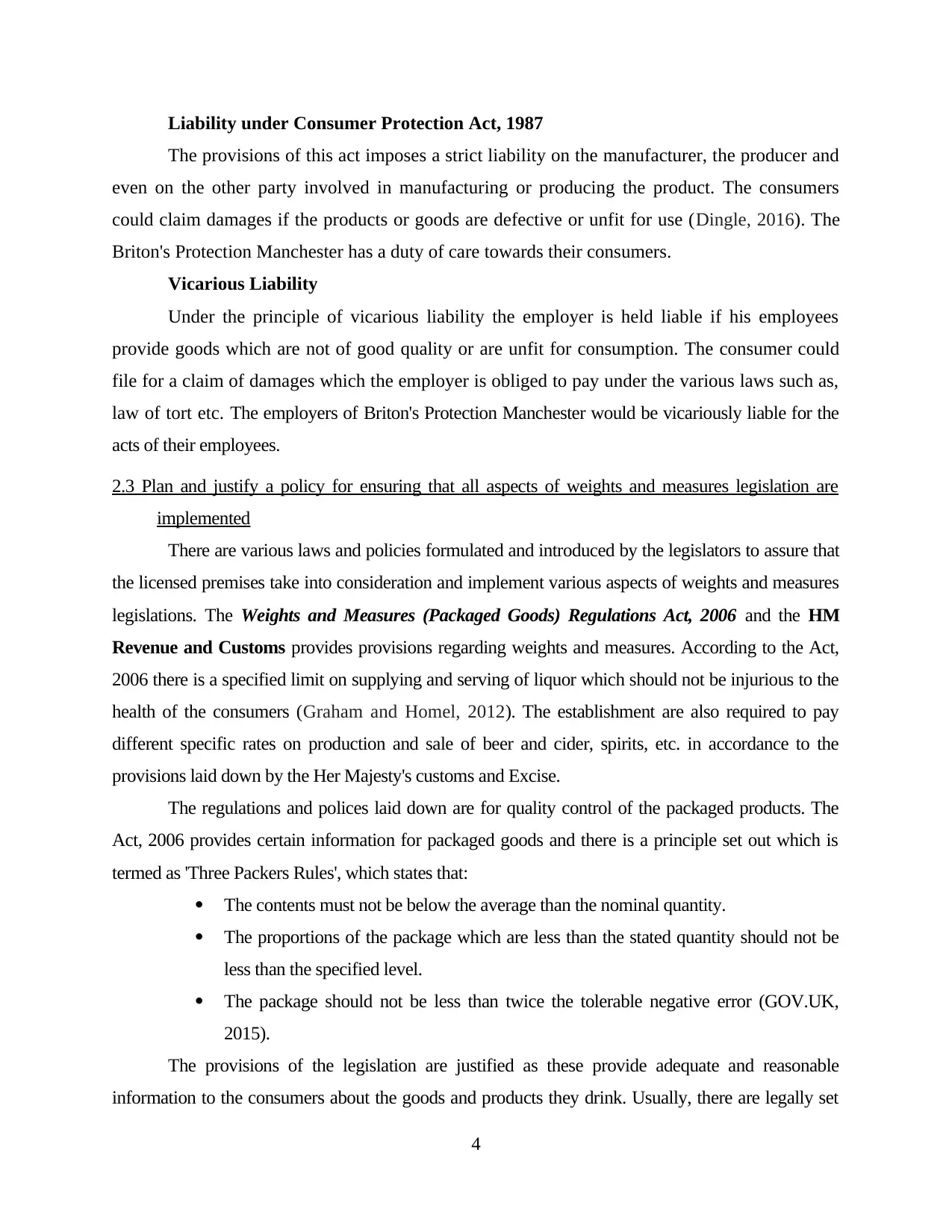
Liability under Consumer Protection Act, 1987
The provisions of this act imposes a strict liability on the manufacturer, the producer and
even on the other party involved in manufacturing or producing the product. The consumers
could claim damages if the products or goods are defective or unfit for use (Dingle, 2016). The
Briton's Protection Manchester has a duty of care towards their consumers.
Vicarious Liability
Under the principle of vicarious liability the employer is held liable if his employees
provide goods which are not of good quality or are unfit for consumption. The consumer could
file for a claim of damages which the employer is obliged to pay under the various laws such as,
law of tort etc. The employers of Briton's Protection Manchester would be vicariously liable for the
acts of their employees.
2.3 Plan and justify a policy for ensuring that all aspects of weights and measures legislation are
implemented
There are various laws and policies formulated and introduced by the legislators to assure that
the licensed premises take into consideration and implement various aspects of weights and measures
legislations. The Weights and Measures (Packaged Goods) Regulations Act, 2006 and the HM
Revenue and Customs provides provisions regarding weights and measures. According to the Act,
2006 there is a specified limit on supplying and serving of liquor which should not be injurious to the
health of the consumers (Graham and Homel, 2012). The establishment are also required to pay
different specific rates on production and sale of beer and cider, spirits, etc. in accordance to the
provisions laid down by the Her Majesty's customs and Excise.
The regulations and polices laid down are for quality control of the packaged products. The
Act, 2006 provides certain information for packaged goods and there is a principle set out which is
termed as 'Three Packers Rules', which states that:
The contents must not be below the average than the nominal quantity.
The proportions of the package which are less than the stated quantity should not be
less than the specified level.
The package should not be less than twice the tolerable negative error (GOV.UK,
2015).
The provisions of the legislation are justified as these provide adequate and reasonable
information to the consumers about the goods and products they drink. Usually, there are legally set
4
The provisions of this act imposes a strict liability on the manufacturer, the producer and
even on the other party involved in manufacturing or producing the product. The consumers
could claim damages if the products or goods are defective or unfit for use (Dingle, 2016). The
Briton's Protection Manchester has a duty of care towards their consumers.
Vicarious Liability
Under the principle of vicarious liability the employer is held liable if his employees
provide goods which are not of good quality or are unfit for consumption. The consumer could
file for a claim of damages which the employer is obliged to pay under the various laws such as,
law of tort etc. The employers of Briton's Protection Manchester would be vicariously liable for the
acts of their employees.
2.3 Plan and justify a policy for ensuring that all aspects of weights and measures legislation are
implemented
There are various laws and policies formulated and introduced by the legislators to assure that
the licensed premises take into consideration and implement various aspects of weights and measures
legislations. The Weights and Measures (Packaged Goods) Regulations Act, 2006 and the HM
Revenue and Customs provides provisions regarding weights and measures. According to the Act,
2006 there is a specified limit on supplying and serving of liquor which should not be injurious to the
health of the consumers (Graham and Homel, 2012). The establishment are also required to pay
different specific rates on production and sale of beer and cider, spirits, etc. in accordance to the
provisions laid down by the Her Majesty's customs and Excise.
The regulations and polices laid down are for quality control of the packaged products. The
Act, 2006 provides certain information for packaged goods and there is a principle set out which is
termed as 'Three Packers Rules', which states that:
The contents must not be below the average than the nominal quantity.
The proportions of the package which are less than the stated quantity should not be
less than the specified level.
The package should not be less than twice the tolerable negative error (GOV.UK,
2015).
The provisions of the legislation are justified as these provide adequate and reasonable
information to the consumers about the goods and products they drink. Usually, there are legally set
4
⊘ This is a preview!⊘
Do you want full access?
Subscribe today to unlock all pages.

Trusted by 1+ million students worldwide
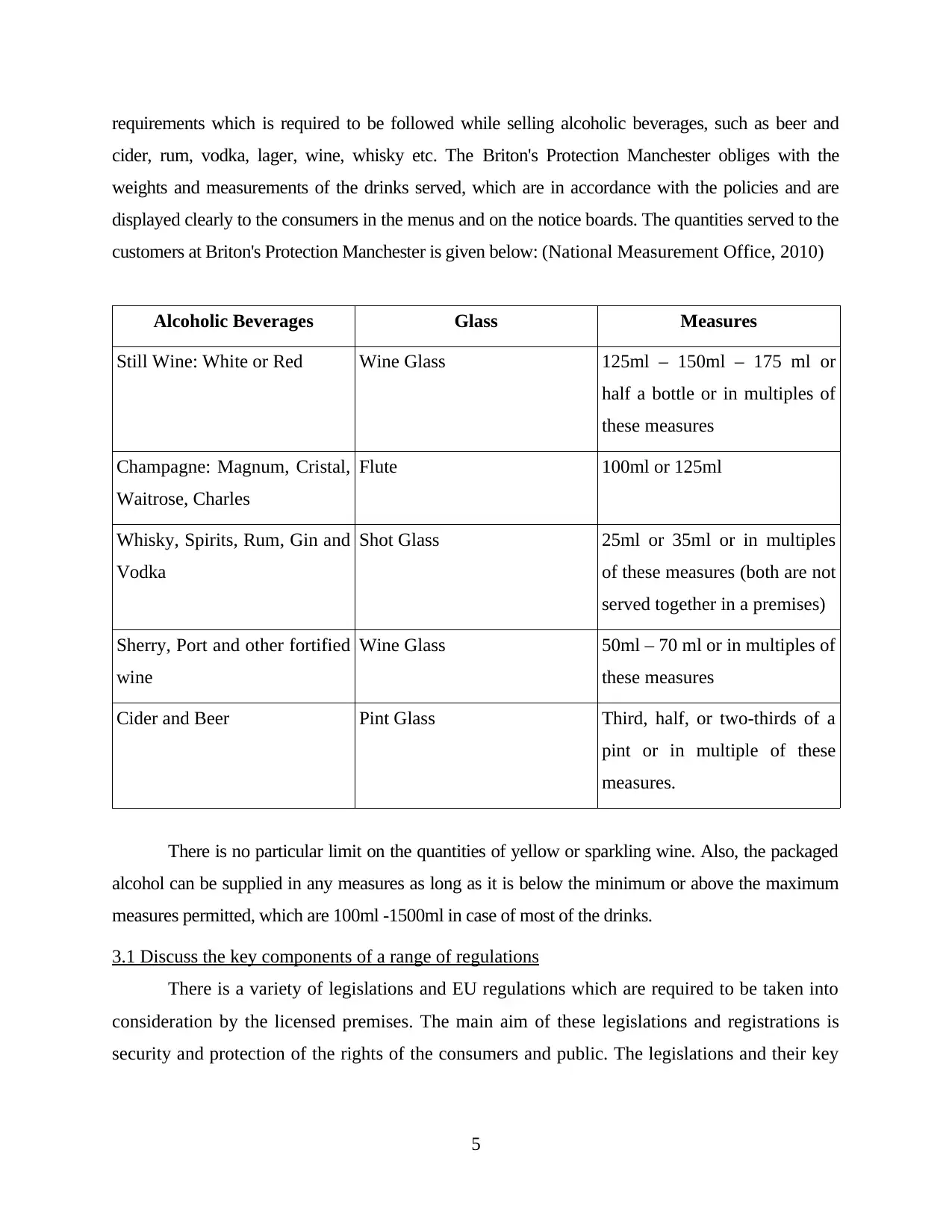
requirements which is required to be followed while selling alcoholic beverages, such as beer and
cider, rum, vodka, lager, wine, whisky etc. The Briton's Protection Manchester obliges with the
weights and measurements of the drinks served, which are in accordance with the policies and are
displayed clearly to the consumers in the menus and on the notice boards. The quantities served to the
customers at Briton's Protection Manchester is given below: (National Measurement Office, 2010)
Alcoholic Beverages Glass Measures
Still Wine: White or Red Wine Glass 125ml – 150ml – 175 ml or
half a bottle or in multiples of
these measures
Champagne: Magnum, Cristal,
Waitrose, Charles
Flute 100ml or 125ml
Whisky, Spirits, Rum, Gin and
Vodka
Shot Glass 25ml or 35ml or in multiples
of these measures (both are not
served together in a premises)
Sherry, Port and other fortified
wine
Wine Glass 50ml – 70 ml or in multiples of
these measures
Cider and Beer Pint Glass Third, half, or two-thirds of a
pint or in multiple of these
measures.
There is no particular limit on the quantities of yellow or sparkling wine. Also, the packaged
alcohol can be supplied in any measures as long as it is below the minimum or above the maximum
measures permitted, which are 100ml -1500ml in case of most of the drinks.
3.1 Discuss the key components of a range of regulations
There is a variety of legislations and EU regulations which are required to be taken into
consideration by the licensed premises. The main aim of these legislations and registrations is
security and protection of the rights of the consumers and public. The legislations and their key
5
cider, rum, vodka, lager, wine, whisky etc. The Briton's Protection Manchester obliges with the
weights and measurements of the drinks served, which are in accordance with the policies and are
displayed clearly to the consumers in the menus and on the notice boards. The quantities served to the
customers at Briton's Protection Manchester is given below: (National Measurement Office, 2010)
Alcoholic Beverages Glass Measures
Still Wine: White or Red Wine Glass 125ml – 150ml – 175 ml or
half a bottle or in multiples of
these measures
Champagne: Magnum, Cristal,
Waitrose, Charles
Flute 100ml or 125ml
Whisky, Spirits, Rum, Gin and
Vodka
Shot Glass 25ml or 35ml or in multiples
of these measures (both are not
served together in a premises)
Sherry, Port and other fortified
wine
Wine Glass 50ml – 70 ml or in multiples of
these measures
Cider and Beer Pint Glass Third, half, or two-thirds of a
pint or in multiple of these
measures.
There is no particular limit on the quantities of yellow or sparkling wine. Also, the packaged
alcohol can be supplied in any measures as long as it is below the minimum or above the maximum
measures permitted, which are 100ml -1500ml in case of most of the drinks.
3.1 Discuss the key components of a range of regulations
There is a variety of legislations and EU regulations which are required to be taken into
consideration by the licensed premises. The main aim of these legislations and registrations is
security and protection of the rights of the consumers and public. The legislations and their key
5
Paraphrase This Document
Need a fresh take? Get an instant paraphrase of this document with our AI Paraphraser
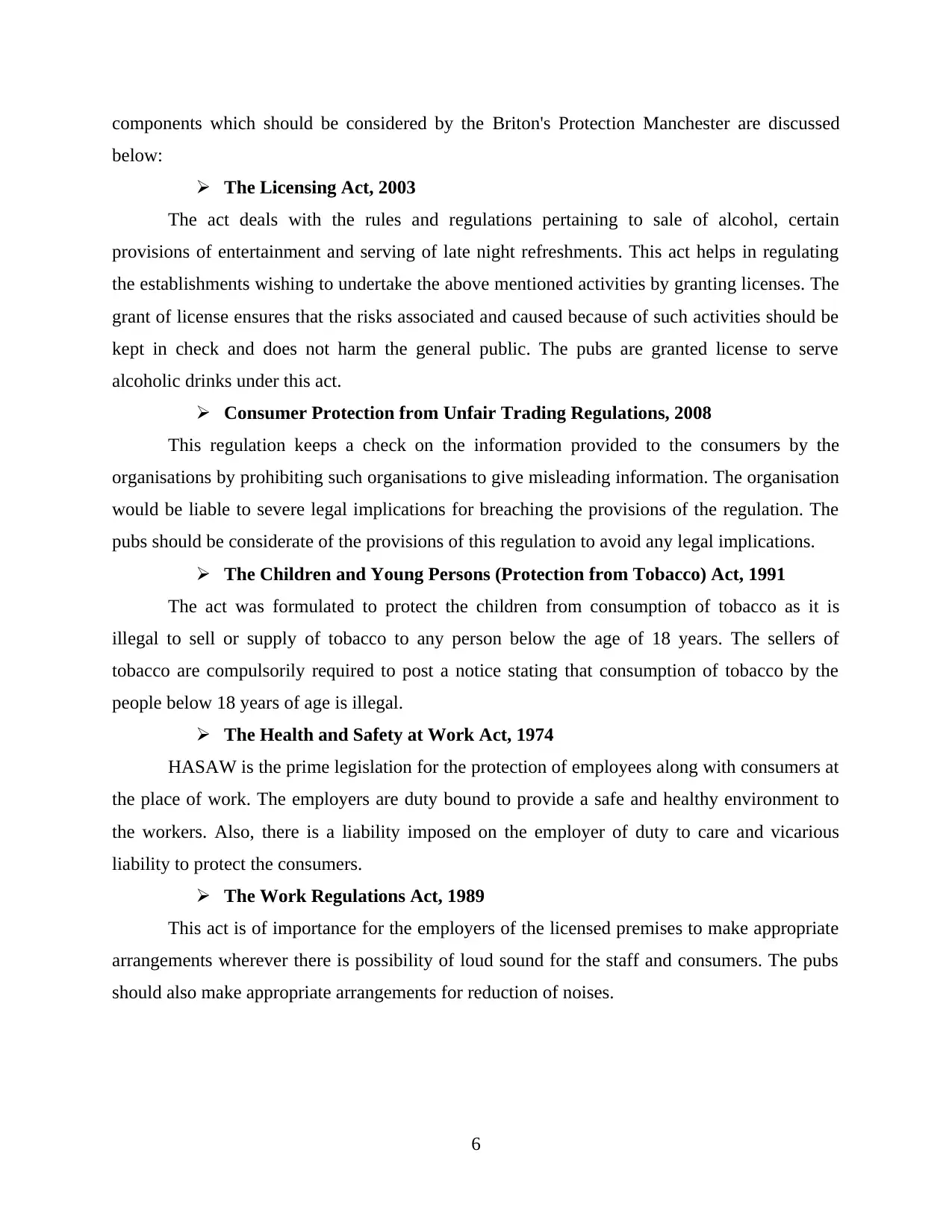
components which should be considered by the Briton's Protection Manchester are discussed
below:
The Licensing Act, 2003
The act deals with the rules and regulations pertaining to sale of alcohol, certain
provisions of entertainment and serving of late night refreshments. This act helps in regulating
the establishments wishing to undertake the above mentioned activities by granting licenses. The
grant of license ensures that the risks associated and caused because of such activities should be
kept in check and does not harm the general public. The pubs are granted license to serve
alcoholic drinks under this act.
Consumer Protection from Unfair Trading Regulations, 2008
This regulation keeps a check on the information provided to the consumers by the
organisations by prohibiting such organisations to give misleading information. The organisation
would be liable to severe legal implications for breaching the provisions of the regulation. The
pubs should be considerate of the provisions of this regulation to avoid any legal implications.
The Children and Young Persons (Protection from Tobacco) Act, 1991
The act was formulated to protect the children from consumption of tobacco as it is
illegal to sell or supply of tobacco to any person below the age of 18 years. The sellers of
tobacco are compulsorily required to post a notice stating that consumption of tobacco by the
people below 18 years of age is illegal.
The Health and Safety at Work Act, 1974
HASAW is the prime legislation for the protection of employees along with consumers at
the place of work. The employers are duty bound to provide a safe and healthy environment to
the workers. Also, there is a liability imposed on the employer of duty to care and vicarious
liability to protect the consumers.
The Work Regulations Act, 1989
This act is of importance for the employers of the licensed premises to make appropriate
arrangements wherever there is possibility of loud sound for the staff and consumers. The pubs
should also make appropriate arrangements for reduction of noises.
6
below:
The Licensing Act, 2003
The act deals with the rules and regulations pertaining to sale of alcohol, certain
provisions of entertainment and serving of late night refreshments. This act helps in regulating
the establishments wishing to undertake the above mentioned activities by granting licenses. The
grant of license ensures that the risks associated and caused because of such activities should be
kept in check and does not harm the general public. The pubs are granted license to serve
alcoholic drinks under this act.
Consumer Protection from Unfair Trading Regulations, 2008
This regulation keeps a check on the information provided to the consumers by the
organisations by prohibiting such organisations to give misleading information. The organisation
would be liable to severe legal implications for breaching the provisions of the regulation. The
pubs should be considerate of the provisions of this regulation to avoid any legal implications.
The Children and Young Persons (Protection from Tobacco) Act, 1991
The act was formulated to protect the children from consumption of tobacco as it is
illegal to sell or supply of tobacco to any person below the age of 18 years. The sellers of
tobacco are compulsorily required to post a notice stating that consumption of tobacco by the
people below 18 years of age is illegal.
The Health and Safety at Work Act, 1974
HASAW is the prime legislation for the protection of employees along with consumers at
the place of work. The employers are duty bound to provide a safe and healthy environment to
the workers. Also, there is a liability imposed on the employer of duty to care and vicarious
liability to protect the consumers.
The Work Regulations Act, 1989
This act is of importance for the employers of the licensed premises to make appropriate
arrangements wherever there is possibility of loud sound for the staff and consumers. The pubs
should also make appropriate arrangements for reduction of noises.
6
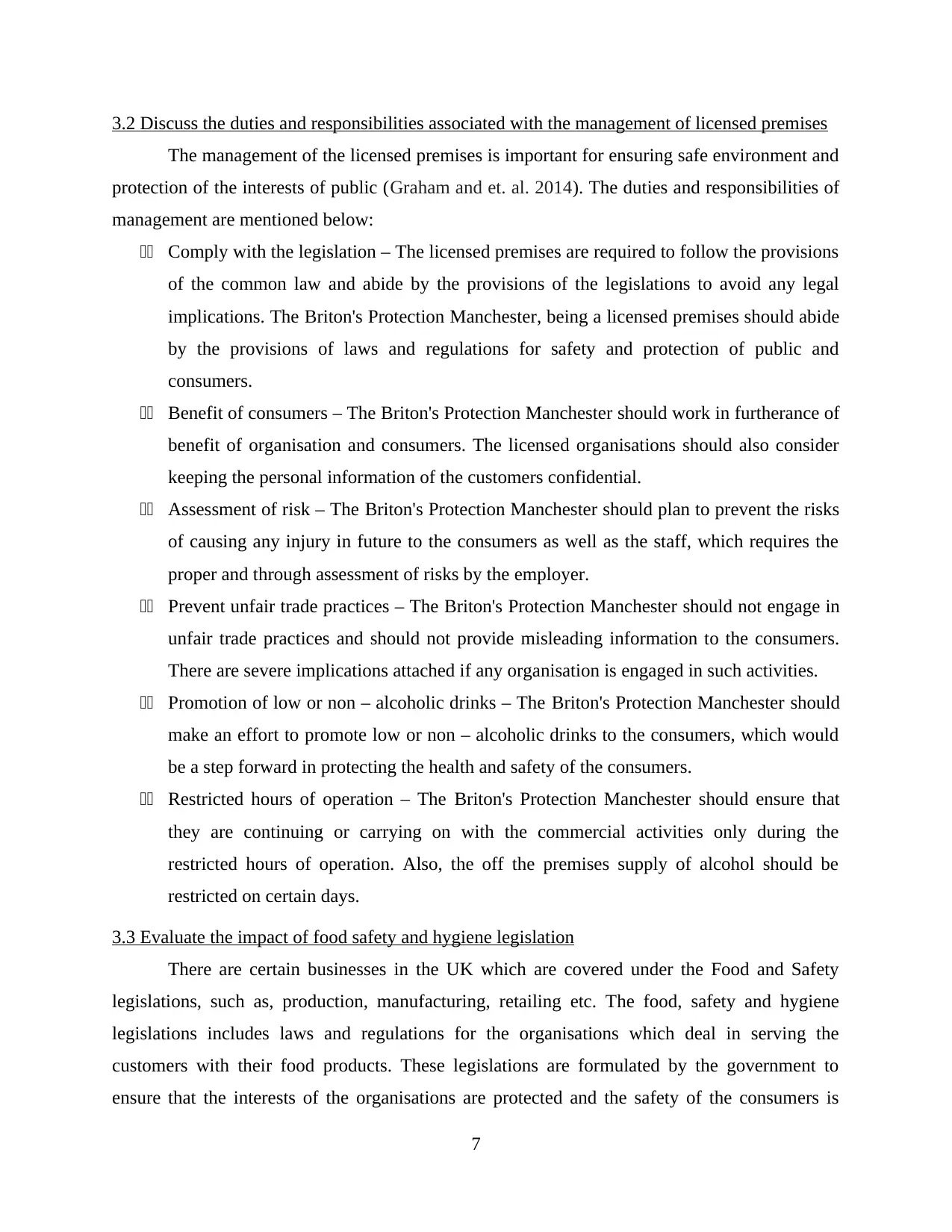
3.2 Discuss the duties and responsibilities associated with the management of licensed premises
The management of the licensed premises is important for ensuring safe environment and
protection of the interests of public (Graham and et. al. 2014). The duties and responsibilities of
management are mentioned below:
11 Comply with the legislation – The licensed premises are required to follow the provisions
of the common law and abide by the provisions of the legislations to avoid any legal
implications. The Briton's Protection Manchester, being a licensed premises should abide
by the provisions of laws and regulations for safety and protection of public and
consumers.
11 Benefit of consumers – The Briton's Protection Manchester should work in furtherance of
benefit of organisation and consumers. The licensed organisations should also consider
keeping the personal information of the customers confidential.
11 Assessment of risk – The Briton's Protection Manchester should plan to prevent the risks
of causing any injury in future to the consumers as well as the staff, which requires the
proper and through assessment of risks by the employer.
11 Prevent unfair trade practices – The Briton's Protection Manchester should not engage in
unfair trade practices and should not provide misleading information to the consumers.
There are severe implications attached if any organisation is engaged in such activities.
11 Promotion of low or non – alcoholic drinks – The Briton's Protection Manchester should
make an effort to promote low or non – alcoholic drinks to the consumers, which would
be a step forward in protecting the health and safety of the consumers.
11 Restricted hours of operation – The Briton's Protection Manchester should ensure that
they are continuing or carrying on with the commercial activities only during the
restricted hours of operation. Also, the off the premises supply of alcohol should be
restricted on certain days.
3.3 Evaluate the impact of food safety and hygiene legislation
There are certain businesses in the UK which are covered under the Food and Safety
legislations, such as, production, manufacturing, retailing etc. The food, safety and hygiene
legislations includes laws and regulations for the organisations which deal in serving the
customers with their food products. These legislations are formulated by the government to
ensure that the interests of the organisations are protected and the safety of the consumers is
7
The management of the licensed premises is important for ensuring safe environment and
protection of the interests of public (Graham and et. al. 2014). The duties and responsibilities of
management are mentioned below:
11 Comply with the legislation – The licensed premises are required to follow the provisions
of the common law and abide by the provisions of the legislations to avoid any legal
implications. The Briton's Protection Manchester, being a licensed premises should abide
by the provisions of laws and regulations for safety and protection of public and
consumers.
11 Benefit of consumers – The Briton's Protection Manchester should work in furtherance of
benefit of organisation and consumers. The licensed organisations should also consider
keeping the personal information of the customers confidential.
11 Assessment of risk – The Briton's Protection Manchester should plan to prevent the risks
of causing any injury in future to the consumers as well as the staff, which requires the
proper and through assessment of risks by the employer.
11 Prevent unfair trade practices – The Briton's Protection Manchester should not engage in
unfair trade practices and should not provide misleading information to the consumers.
There are severe implications attached if any organisation is engaged in such activities.
11 Promotion of low or non – alcoholic drinks – The Briton's Protection Manchester should
make an effort to promote low or non – alcoholic drinks to the consumers, which would
be a step forward in protecting the health and safety of the consumers.
11 Restricted hours of operation – The Briton's Protection Manchester should ensure that
they are continuing or carrying on with the commercial activities only during the
restricted hours of operation. Also, the off the premises supply of alcohol should be
restricted on certain days.
3.3 Evaluate the impact of food safety and hygiene legislation
There are certain businesses in the UK which are covered under the Food and Safety
legislations, such as, production, manufacturing, retailing etc. The food, safety and hygiene
legislations includes laws and regulations for the organisations which deal in serving the
customers with their food products. These legislations are formulated by the government to
ensure that the interests of the organisations are protected and the safety of the consumers is
7
⊘ This is a preview!⊘
Do you want full access?
Subscribe today to unlock all pages.

Trusted by 1+ million students worldwide
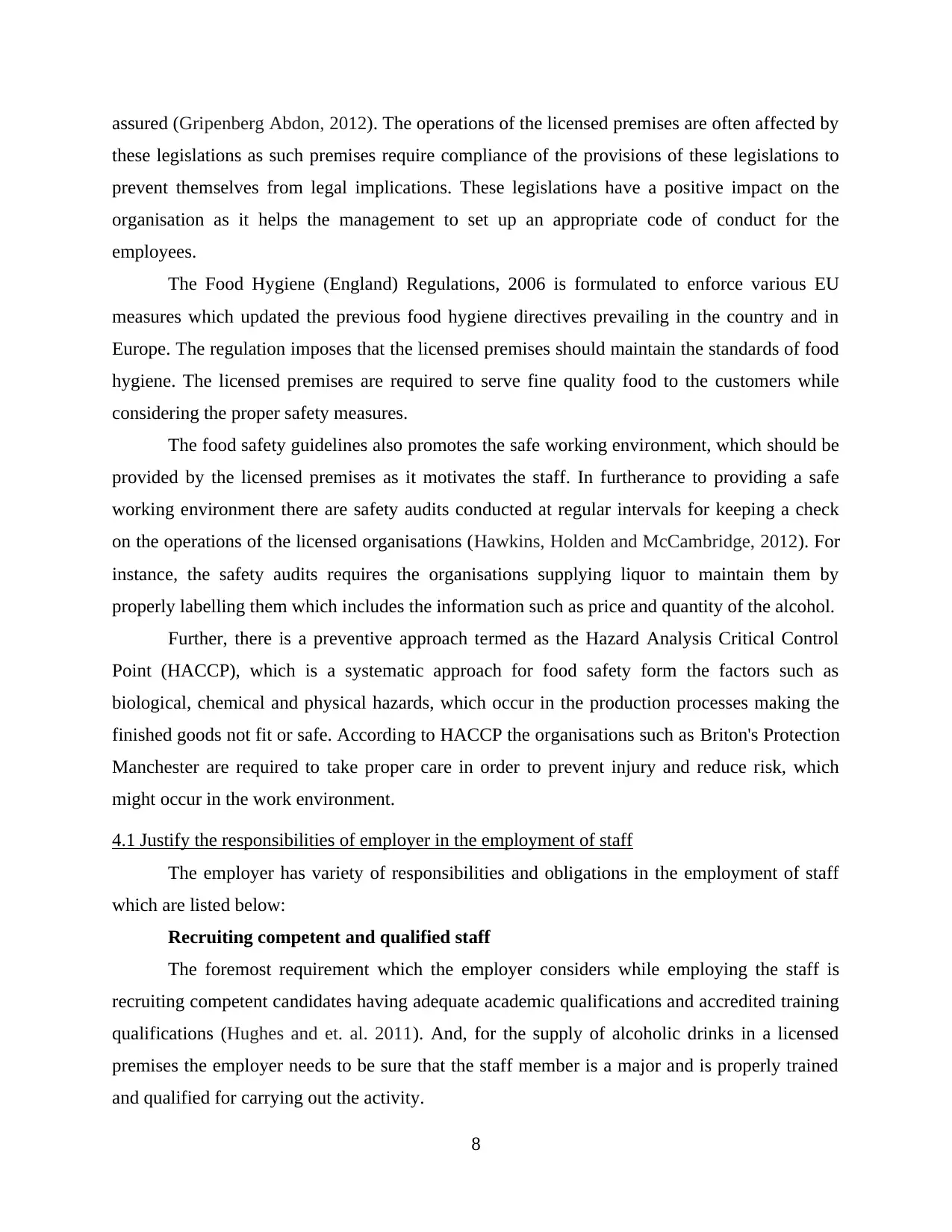
assured (Gripenberg Abdon, 2012). The operations of the licensed premises are often affected by
these legislations as such premises require compliance of the provisions of these legislations to
prevent themselves from legal implications. These legislations have a positive impact on the
organisation as it helps the management to set up an appropriate code of conduct for the
employees.
The Food Hygiene (England) Regulations, 2006 is formulated to enforce various EU
measures which updated the previous food hygiene directives prevailing in the country and in
Europe. The regulation imposes that the licensed premises should maintain the standards of food
hygiene. The licensed premises are required to serve fine quality food to the customers while
considering the proper safety measures.
The food safety guidelines also promotes the safe working environment, which should be
provided by the licensed premises as it motivates the staff. In furtherance to providing a safe
working environment there are safety audits conducted at regular intervals for keeping a check
on the operations of the licensed organisations (Hawkins, Holden and McCambridge, 2012). For
instance, the safety audits requires the organisations supplying liquor to maintain them by
properly labelling them which includes the information such as price and quantity of the alcohol.
Further, there is a preventive approach termed as the Hazard Analysis Critical Control
Point (HACCP), which is a systematic approach for food safety form the factors such as
biological, chemical and physical hazards, which occur in the production processes making the
finished goods not fit or safe. According to HACCP the organisations such as Briton's Protection
Manchester are required to take proper care in order to prevent injury and reduce risk, which
might occur in the work environment.
4.1 Justify the responsibilities of employer in the employment of staff
The employer has variety of responsibilities and obligations in the employment of staff
which are listed below:
Recruiting competent and qualified staff
The foremost requirement which the employer considers while employing the staff is
recruiting competent candidates having adequate academic qualifications and accredited training
qualifications (Hughes and et. al. 2011). And, for the supply of alcoholic drinks in a licensed
premises the employer needs to be sure that the staff member is a major and is properly trained
and qualified for carrying out the activity.
8
these legislations as such premises require compliance of the provisions of these legislations to
prevent themselves from legal implications. These legislations have a positive impact on the
organisation as it helps the management to set up an appropriate code of conduct for the
employees.
The Food Hygiene (England) Regulations, 2006 is formulated to enforce various EU
measures which updated the previous food hygiene directives prevailing in the country and in
Europe. The regulation imposes that the licensed premises should maintain the standards of food
hygiene. The licensed premises are required to serve fine quality food to the customers while
considering the proper safety measures.
The food safety guidelines also promotes the safe working environment, which should be
provided by the licensed premises as it motivates the staff. In furtherance to providing a safe
working environment there are safety audits conducted at regular intervals for keeping a check
on the operations of the licensed organisations (Hawkins, Holden and McCambridge, 2012). For
instance, the safety audits requires the organisations supplying liquor to maintain them by
properly labelling them which includes the information such as price and quantity of the alcohol.
Further, there is a preventive approach termed as the Hazard Analysis Critical Control
Point (HACCP), which is a systematic approach for food safety form the factors such as
biological, chemical and physical hazards, which occur in the production processes making the
finished goods not fit or safe. According to HACCP the organisations such as Briton's Protection
Manchester are required to take proper care in order to prevent injury and reduce risk, which
might occur in the work environment.
4.1 Justify the responsibilities of employer in the employment of staff
The employer has variety of responsibilities and obligations in the employment of staff
which are listed below:
Recruiting competent and qualified staff
The foremost requirement which the employer considers while employing the staff is
recruiting competent candidates having adequate academic qualifications and accredited training
qualifications (Hughes and et. al. 2011). And, for the supply of alcoholic drinks in a licensed
premises the employer needs to be sure that the staff member is a major and is properly trained
and qualified for carrying out the activity.
8
Paraphrase This Document
Need a fresh take? Get an instant paraphrase of this document with our AI Paraphraser
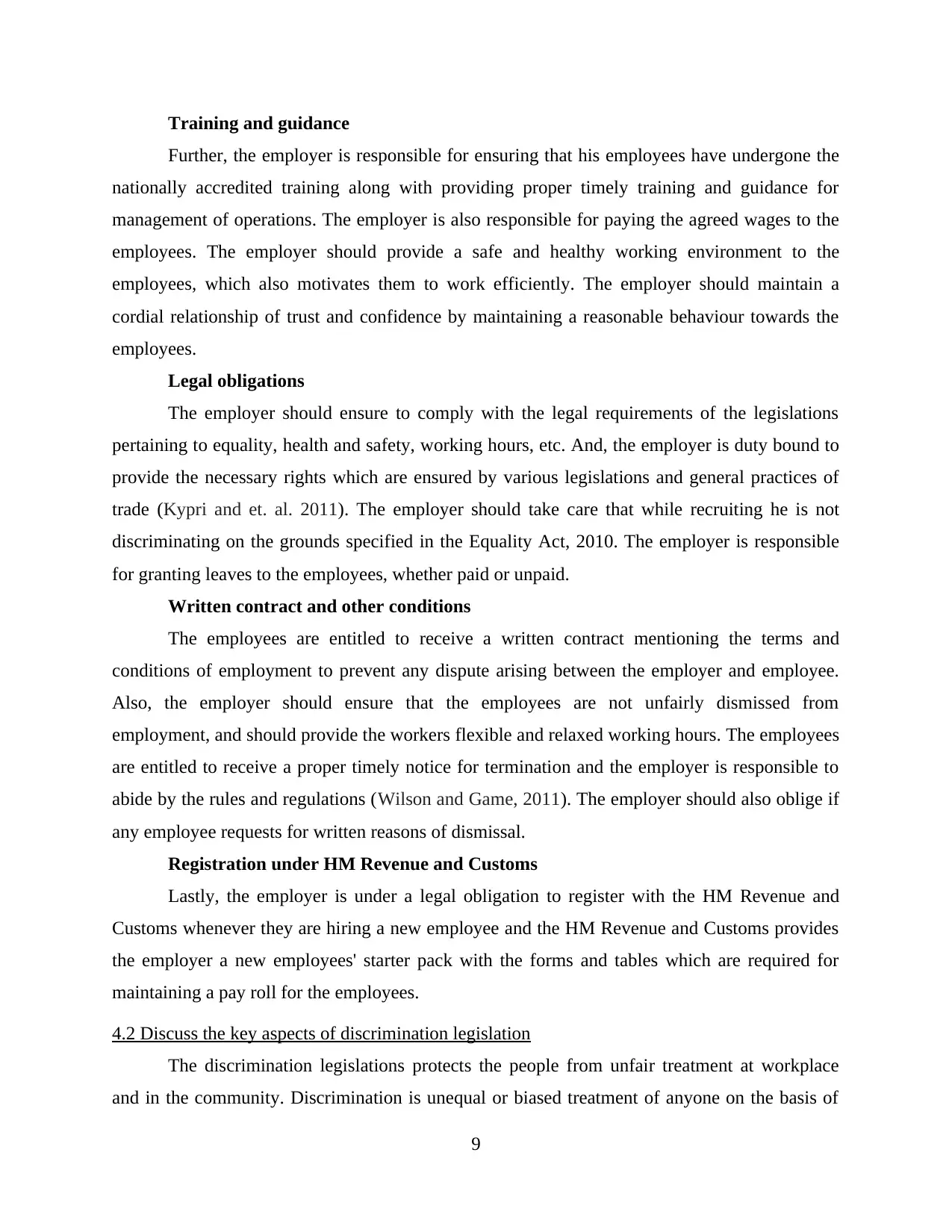
Training and guidance
Further, the employer is responsible for ensuring that his employees have undergone the
nationally accredited training along with providing proper timely training and guidance for
management of operations. The employer is also responsible for paying the agreed wages to the
employees. The employer should provide a safe and healthy working environment to the
employees, which also motivates them to work efficiently. The employer should maintain a
cordial relationship of trust and confidence by maintaining a reasonable behaviour towards the
employees.
Legal obligations
The employer should ensure to comply with the legal requirements of the legislations
pertaining to equality, health and safety, working hours, etc. And, the employer is duty bound to
provide the necessary rights which are ensured by various legislations and general practices of
trade (Kypri and et. al. 2011). The employer should take care that while recruiting he is not
discriminating on the grounds specified in the Equality Act, 2010. The employer is responsible
for granting leaves to the employees, whether paid or unpaid.
Written contract and other conditions
The employees are entitled to receive a written contract mentioning the terms and
conditions of employment to prevent any dispute arising between the employer and employee.
Also, the employer should ensure that the employees are not unfairly dismissed from
employment, and should provide the workers flexible and relaxed working hours. The employees
are entitled to receive a proper timely notice for termination and the employer is responsible to
abide by the rules and regulations (Wilson and Game, 2011). The employer should also oblige if
any employee requests for written reasons of dismissal.
Registration under HM Revenue and Customs
Lastly, the employer is under a legal obligation to register with the HM Revenue and
Customs whenever they are hiring a new employee and the HM Revenue and Customs provides
the employer a new employees' starter pack with the forms and tables which are required for
maintaining a pay roll for the employees.
4.2 Discuss the key aspects of discrimination legislation
The discrimination legislations protects the people from unfair treatment at workplace
and in the community. Discrimination is unequal or biased treatment of anyone on the basis of
9
Further, the employer is responsible for ensuring that his employees have undergone the
nationally accredited training along with providing proper timely training and guidance for
management of operations. The employer is also responsible for paying the agreed wages to the
employees. The employer should provide a safe and healthy working environment to the
employees, which also motivates them to work efficiently. The employer should maintain a
cordial relationship of trust and confidence by maintaining a reasonable behaviour towards the
employees.
Legal obligations
The employer should ensure to comply with the legal requirements of the legislations
pertaining to equality, health and safety, working hours, etc. And, the employer is duty bound to
provide the necessary rights which are ensured by various legislations and general practices of
trade (Kypri and et. al. 2011). The employer should take care that while recruiting he is not
discriminating on the grounds specified in the Equality Act, 2010. The employer is responsible
for granting leaves to the employees, whether paid or unpaid.
Written contract and other conditions
The employees are entitled to receive a written contract mentioning the terms and
conditions of employment to prevent any dispute arising between the employer and employee.
Also, the employer should ensure that the employees are not unfairly dismissed from
employment, and should provide the workers flexible and relaxed working hours. The employees
are entitled to receive a proper timely notice for termination and the employer is responsible to
abide by the rules and regulations (Wilson and Game, 2011). The employer should also oblige if
any employee requests for written reasons of dismissal.
Registration under HM Revenue and Customs
Lastly, the employer is under a legal obligation to register with the HM Revenue and
Customs whenever they are hiring a new employee and the HM Revenue and Customs provides
the employer a new employees' starter pack with the forms and tables which are required for
maintaining a pay roll for the employees.
4.2 Discuss the key aspects of discrimination legislation
The discrimination legislations protects the people from unfair treatment at workplace
and in the community. Discrimination is unequal or biased treatment of anyone on the basis of
9
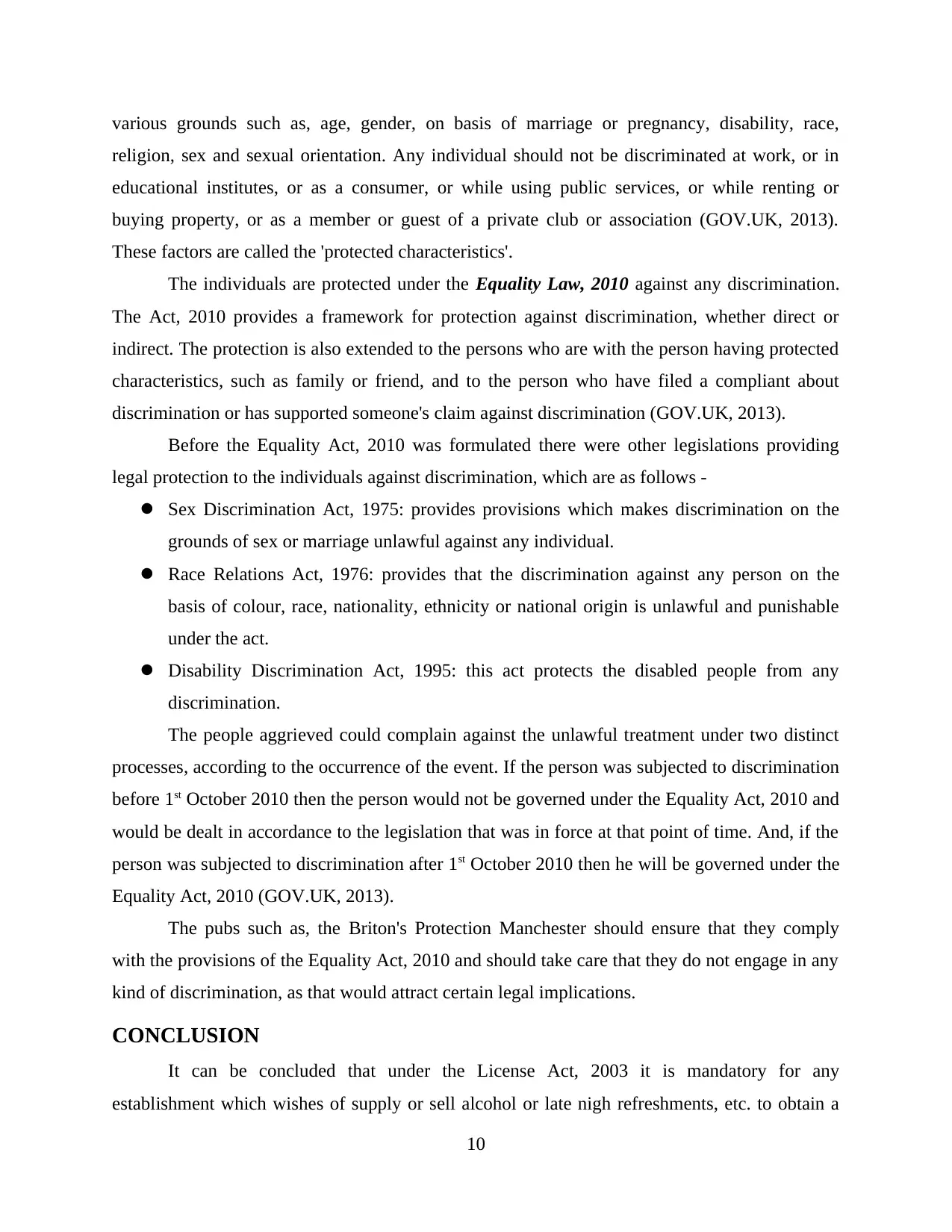
various grounds such as, age, gender, on basis of marriage or pregnancy, disability, race,
religion, sex and sexual orientation. Any individual should not be discriminated at work, or in
educational institutes, or as a consumer, or while using public services, or while renting or
buying property, or as a member or guest of a private club or association (GOV.UK, 2013).
These factors are called the 'protected characteristics'.
The individuals are protected under the Equality Law, 2010 against any discrimination.
The Act, 2010 provides a framework for protection against discrimination, whether direct or
indirect. The protection is also extended to the persons who are with the person having protected
characteristics, such as family or friend, and to the person who have filed a compliant about
discrimination or has supported someone's claim against discrimination (GOV.UK, 2013).
Before the Equality Act, 2010 was formulated there were other legislations providing
legal protection to the individuals against discrimination, which are as follows -
Sex Discrimination Act, 1975: provides provisions which makes discrimination on the
grounds of sex or marriage unlawful against any individual.
Race Relations Act, 1976: provides that the discrimination against any person on the
basis of colour, race, nationality, ethnicity or national origin is unlawful and punishable
under the act.
Disability Discrimination Act, 1995: this act protects the disabled people from any
discrimination.
The people aggrieved could complain against the unlawful treatment under two distinct
processes, according to the occurrence of the event. If the person was subjected to discrimination
before 1st October 2010 then the person would not be governed under the Equality Act, 2010 and
would be dealt in accordance to the legislation that was in force at that point of time. And, if the
person was subjected to discrimination after 1st October 2010 then he will be governed under the
Equality Act, 2010 (GOV.UK, 2013).
The pubs such as, the Briton's Protection Manchester should ensure that they comply
with the provisions of the Equality Act, 2010 and should take care that they do not engage in any
kind of discrimination, as that would attract certain legal implications.
CONCLUSION
It can be concluded that under the License Act, 2003 it is mandatory for any
establishment which wishes of supply or sell alcohol or late nigh refreshments, etc. to obtain a
10
religion, sex and sexual orientation. Any individual should not be discriminated at work, or in
educational institutes, or as a consumer, or while using public services, or while renting or
buying property, or as a member or guest of a private club or association (GOV.UK, 2013).
These factors are called the 'protected characteristics'.
The individuals are protected under the Equality Law, 2010 against any discrimination.
The Act, 2010 provides a framework for protection against discrimination, whether direct or
indirect. The protection is also extended to the persons who are with the person having protected
characteristics, such as family or friend, and to the person who have filed a compliant about
discrimination or has supported someone's claim against discrimination (GOV.UK, 2013).
Before the Equality Act, 2010 was formulated there were other legislations providing
legal protection to the individuals against discrimination, which are as follows -
Sex Discrimination Act, 1975: provides provisions which makes discrimination on the
grounds of sex or marriage unlawful against any individual.
Race Relations Act, 1976: provides that the discrimination against any person on the
basis of colour, race, nationality, ethnicity or national origin is unlawful and punishable
under the act.
Disability Discrimination Act, 1995: this act protects the disabled people from any
discrimination.
The people aggrieved could complain against the unlawful treatment under two distinct
processes, according to the occurrence of the event. If the person was subjected to discrimination
before 1st October 2010 then the person would not be governed under the Equality Act, 2010 and
would be dealt in accordance to the legislation that was in force at that point of time. And, if the
person was subjected to discrimination after 1st October 2010 then he will be governed under the
Equality Act, 2010 (GOV.UK, 2013).
The pubs such as, the Briton's Protection Manchester should ensure that they comply
with the provisions of the Equality Act, 2010 and should take care that they do not engage in any
kind of discrimination, as that would attract certain legal implications.
CONCLUSION
It can be concluded that under the License Act, 2003 it is mandatory for any
establishment which wishes of supply or sell alcohol or late nigh refreshments, etc. to obtain a
10
⊘ This is a preview!⊘
Do you want full access?
Subscribe today to unlock all pages.

Trusted by 1+ million students worldwide
1 out of 14
Related Documents
Your All-in-One AI-Powered Toolkit for Academic Success.
+13062052269
info@desklib.com
Available 24*7 on WhatsApp / Email
![[object Object]](/_next/static/media/star-bottom.7253800d.svg)
Unlock your academic potential
Copyright © 2020–2026 A2Z Services. All Rights Reserved. Developed and managed by ZUCOL.





